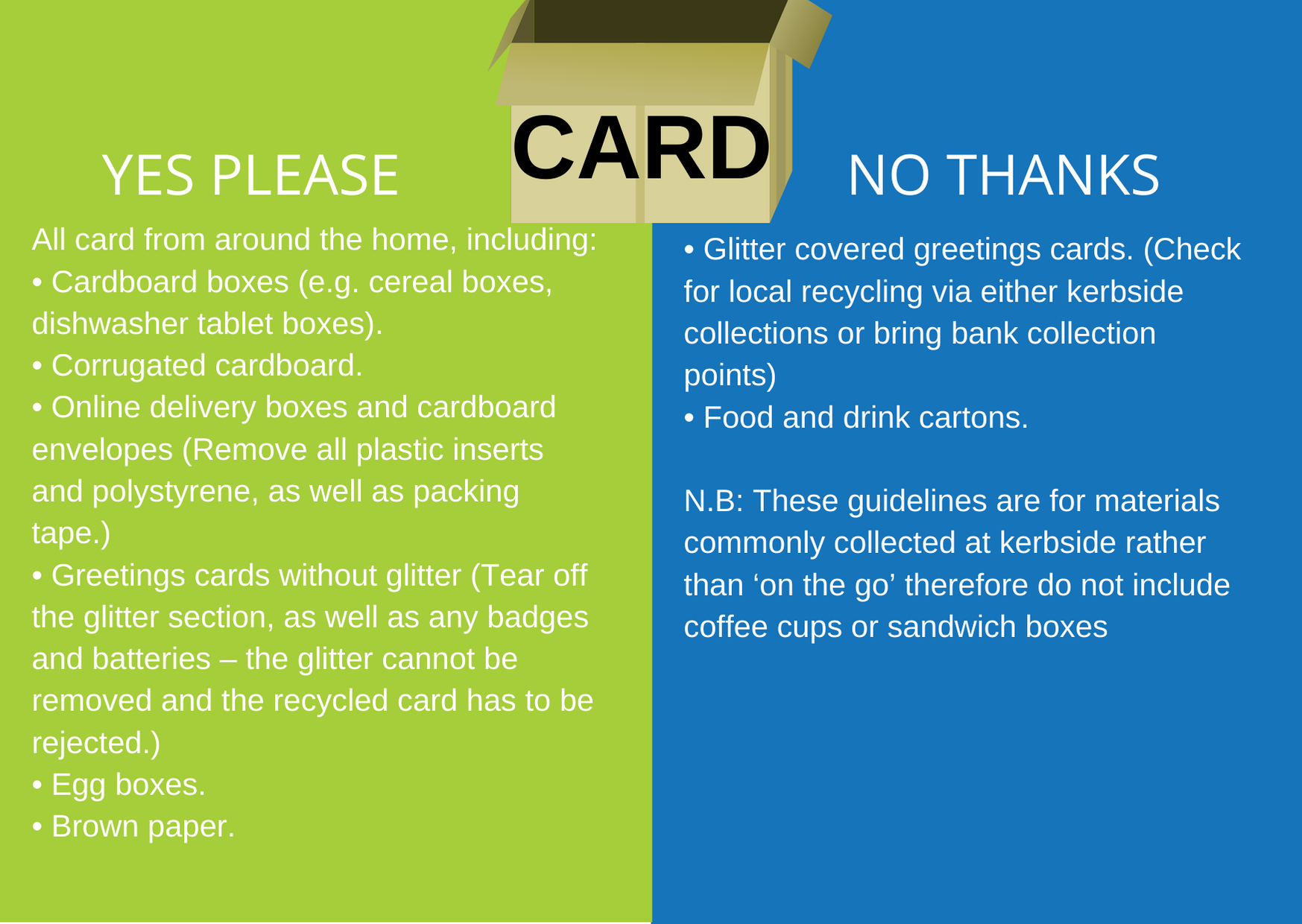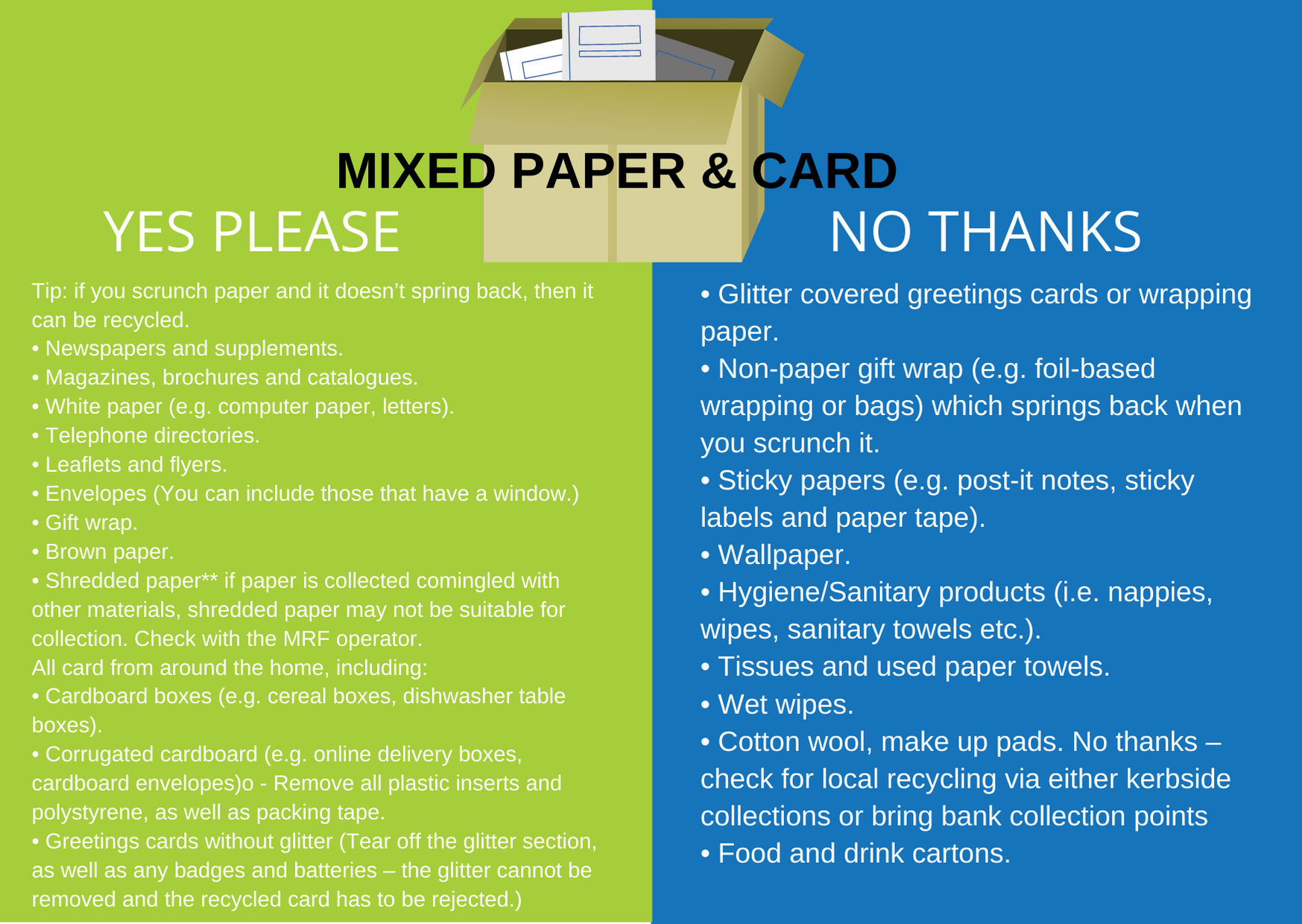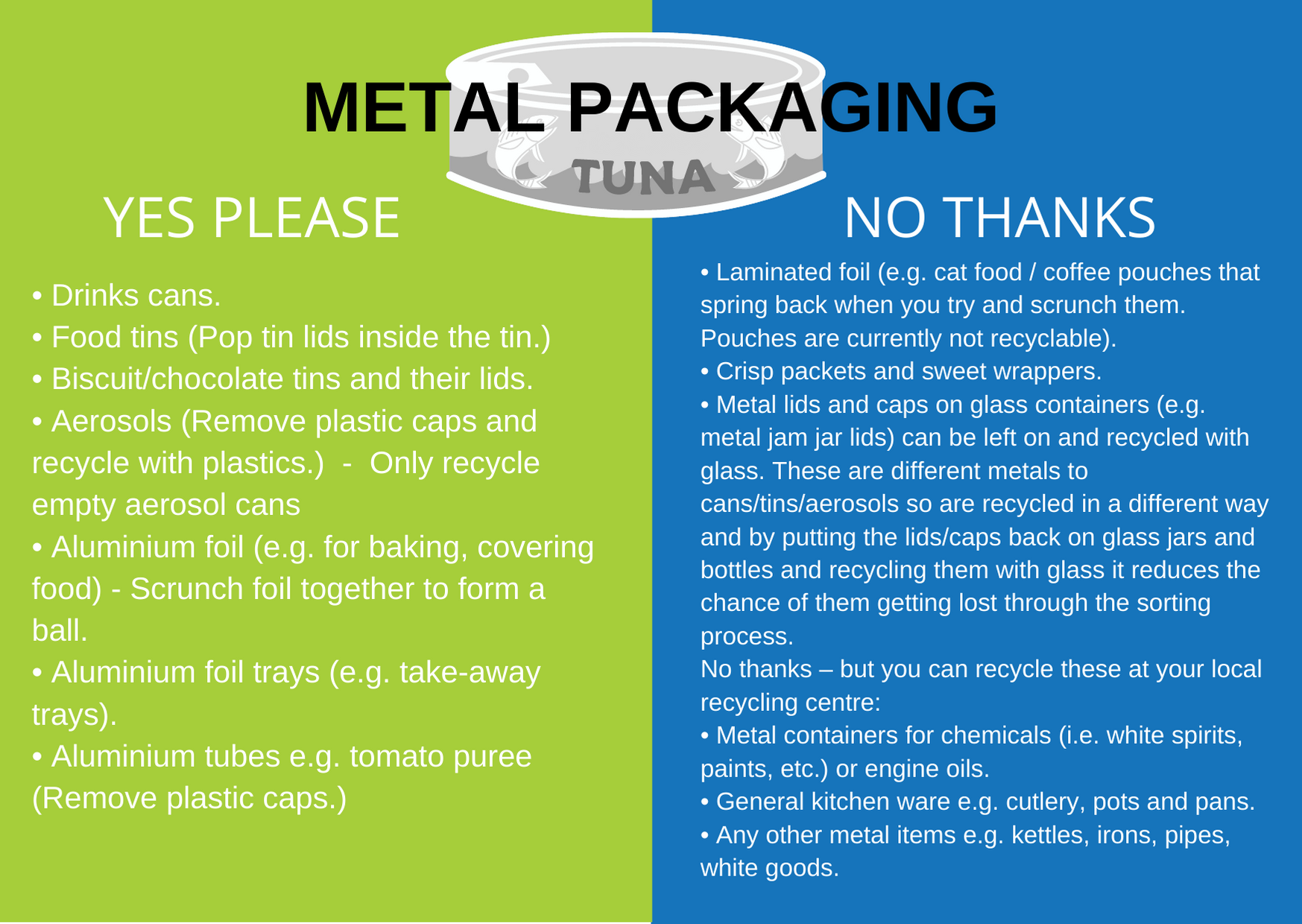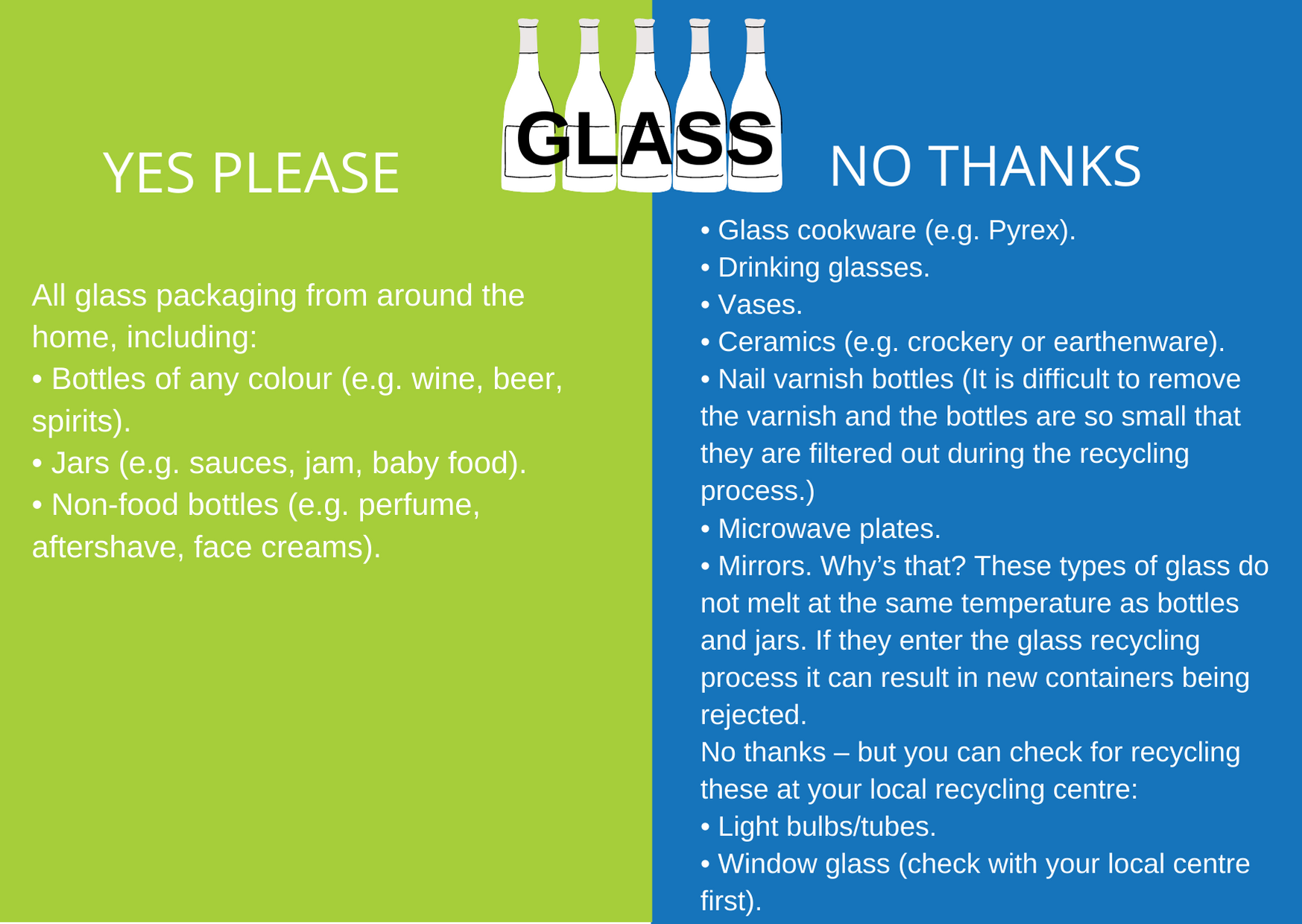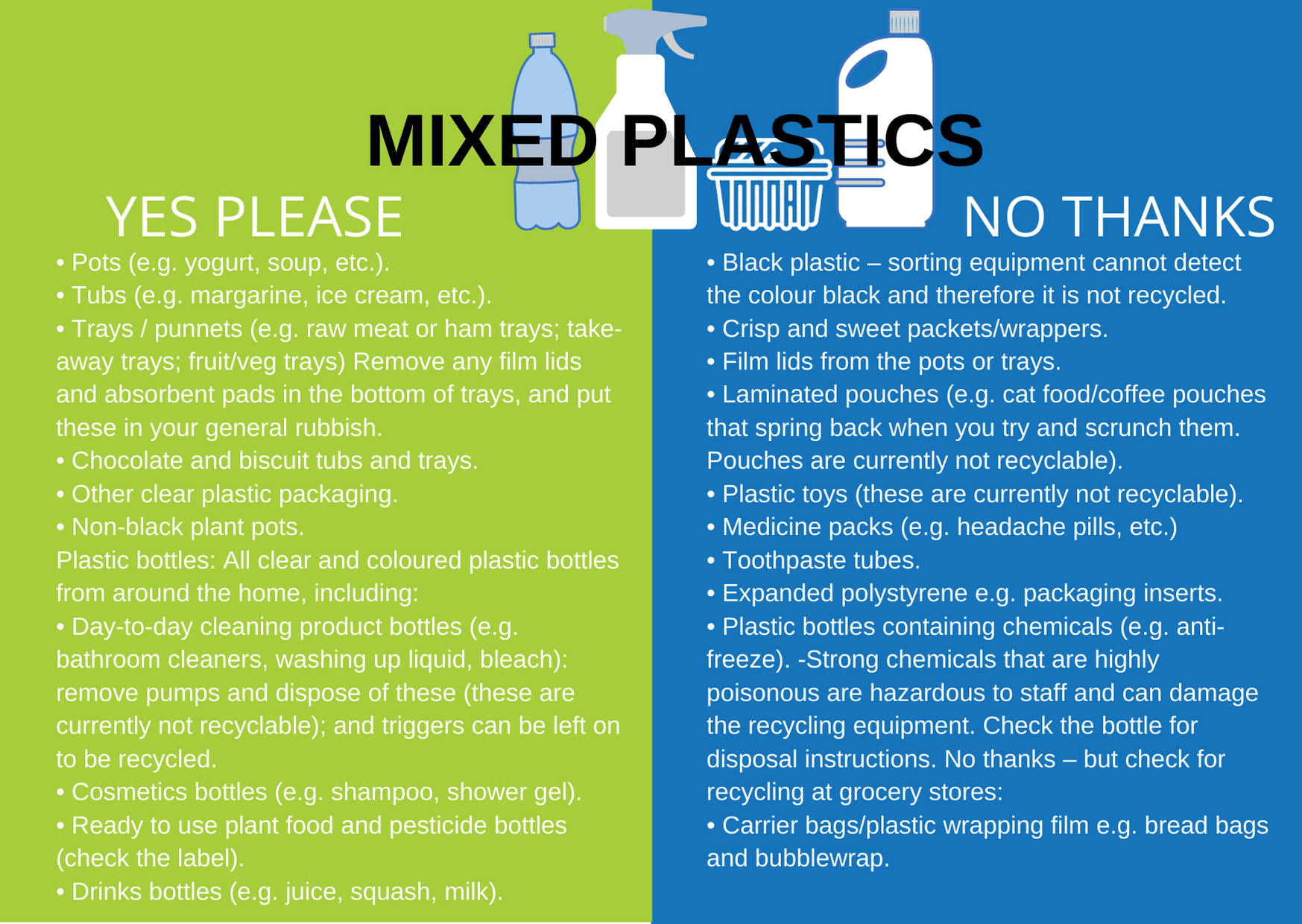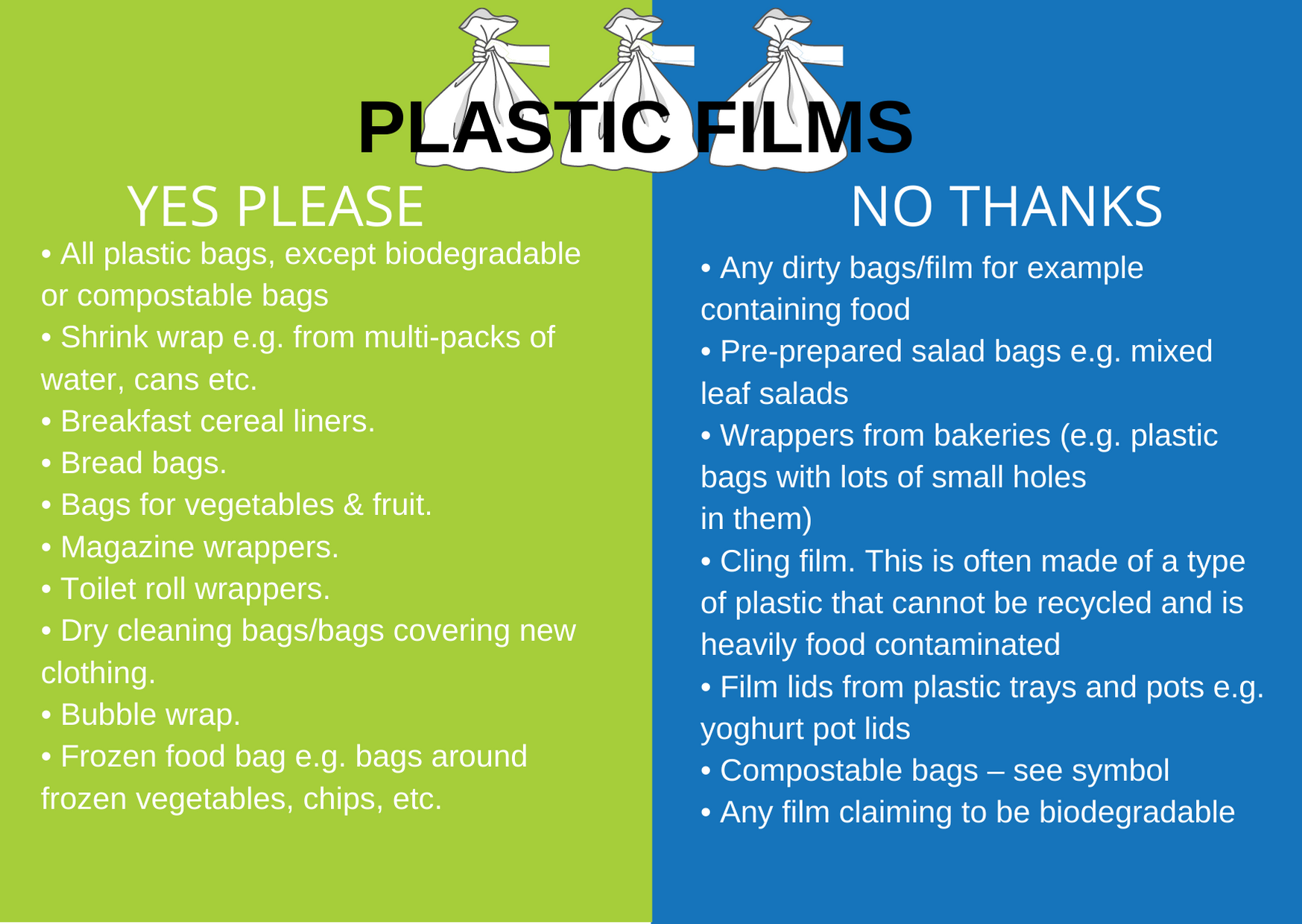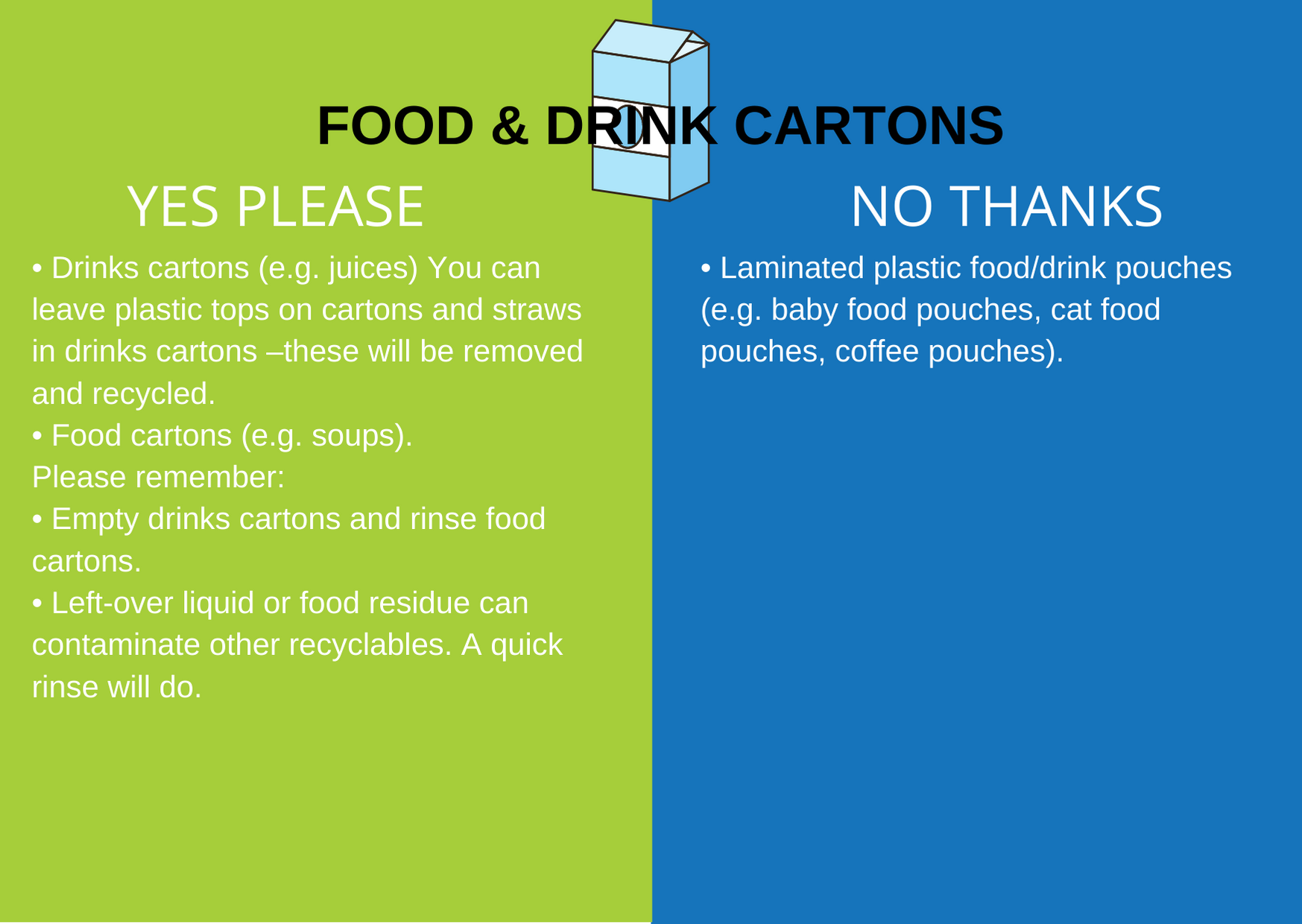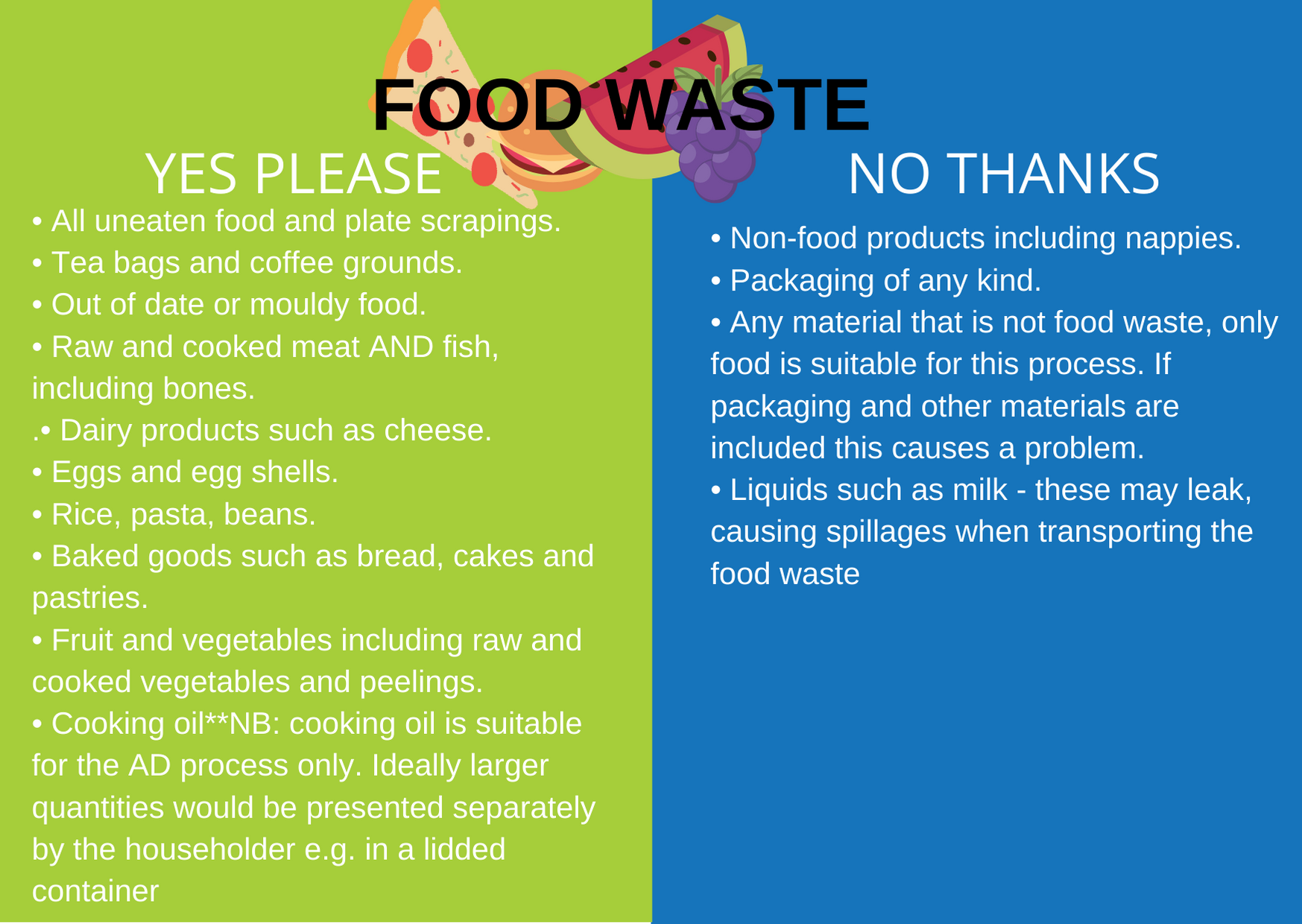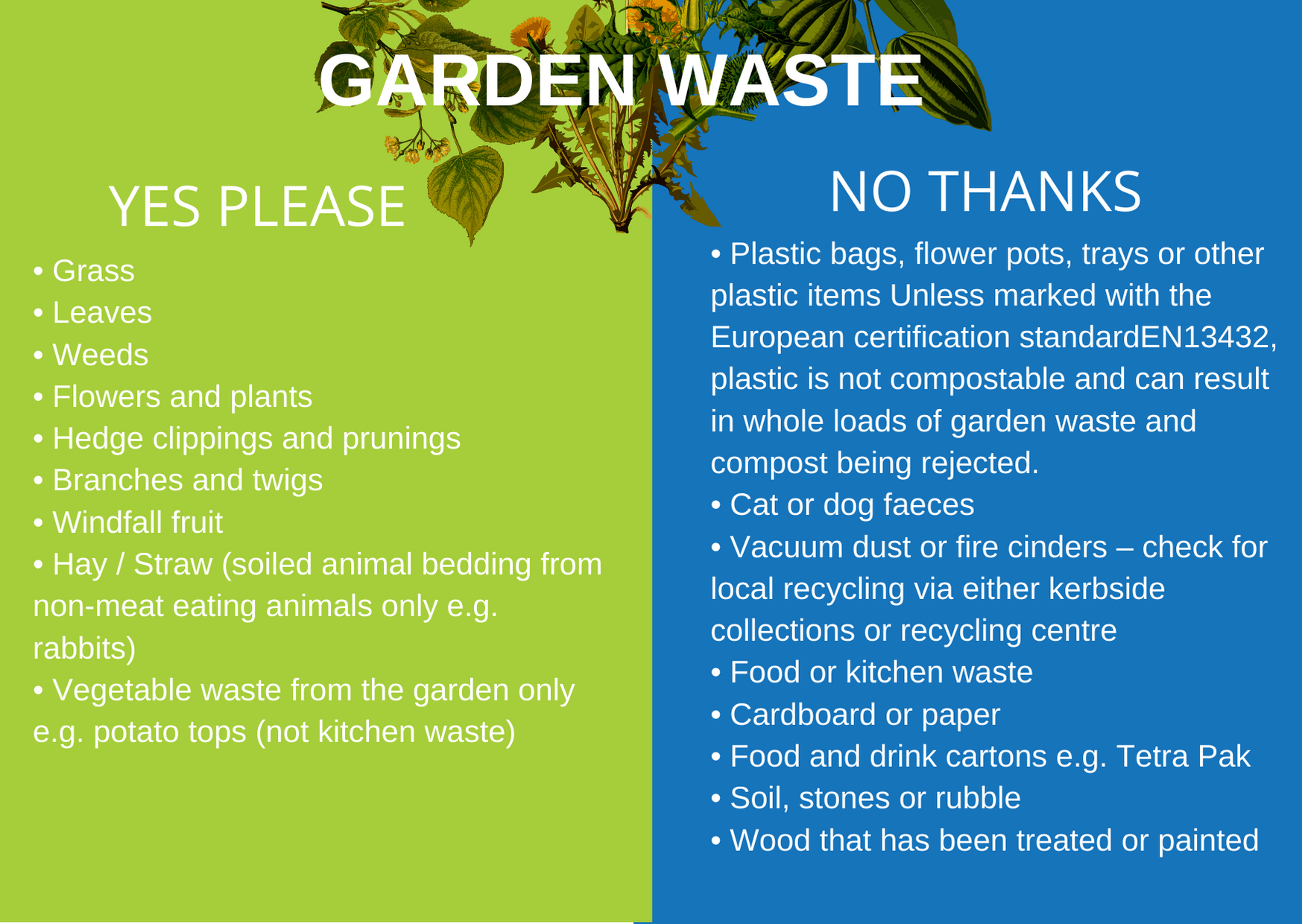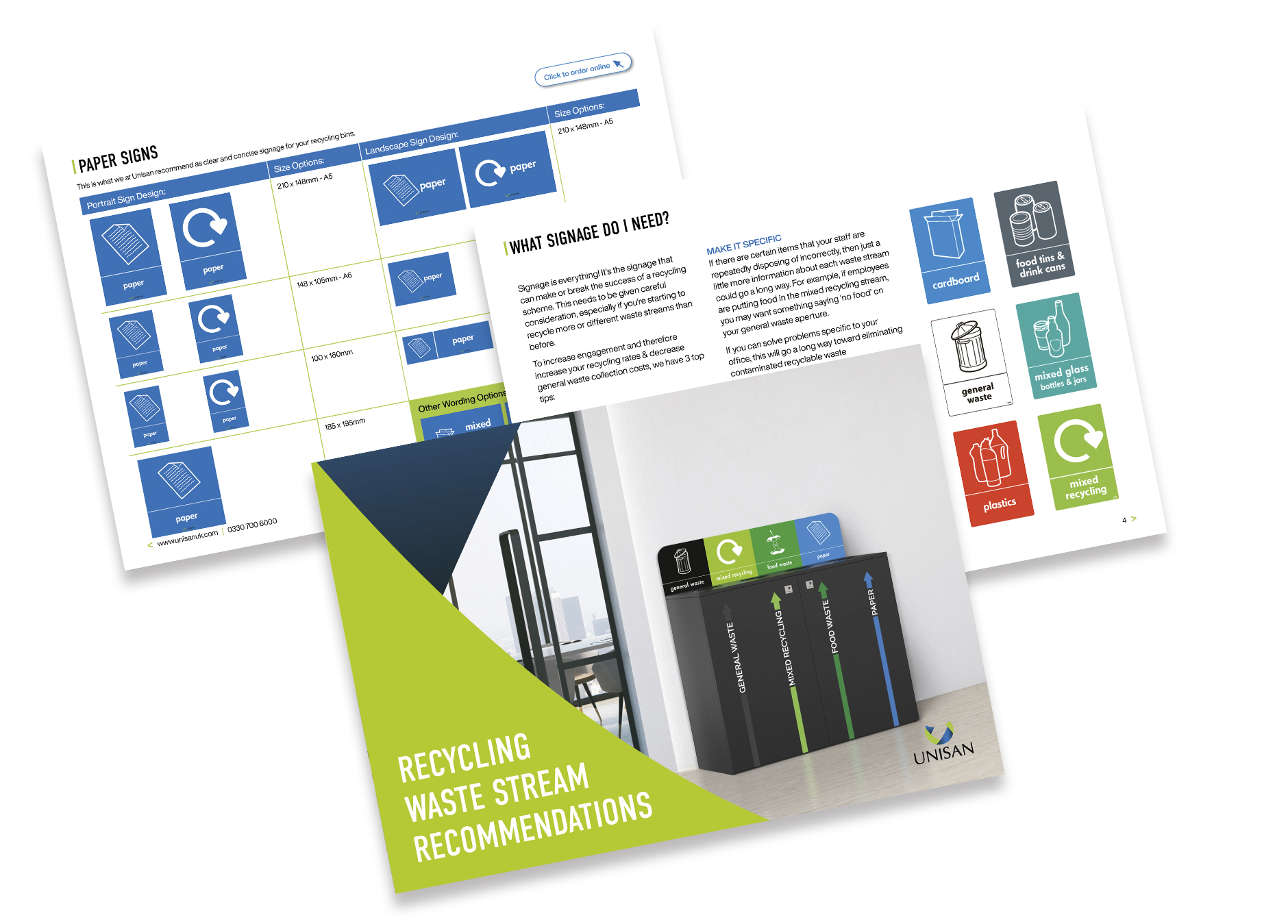Its no secret that recycling can be confusing, and it can be difficult to know whether you are following all the right rules. Our mission is to help you understand what you can and can’t recycle with this recycling guide. Improve your recycling efforts by learning some recycling etiquette rules and check out which type of collection is best and why different areas recycle and collect in different ways.
A large percentage of UK household’s and businesses still do not recycle enough and throw everything that they consider ‘rubbish’ into their ordinary bins. Much of this waste can be recycled and should be disposed of separately to general waste. This helps less go to landfill, and means the materials can be reprocessed into something new, helping the environment. Read our post here on why recycling helps the environment, and why landfills are bad for the environment.
We recommend the WRAP guidelines, as they are an excellent industry benchmark to go by for recycling in the UK, and have been subjected to consumer testing. WRAP (The Waste and Resources Action Programme) collaborated with several recycling and environment associations to create a recycling guide, on what can and can’t be recycled, along with how the waste should be presented.
They go by a national agreement from the recycling industry on what can and cannot be collected for recycling from householders and how those materials should be presented for collection to:
• Increase consistency in household recycling across the nation
• Reduce confusion for householders and workplaces
• Improve material quality
• Save money
The consumer testing of WRAPs recycling guide revealed a low level of awareness amongst consumers of many items that are currently not recyclable, as well as highlighting a number of items which are often not recycled owing to a lack of knowledge or confusion. It also highlighted how detailed and complicated recycling can be. In order to increase capture and reduce contamination, simple messages via targeted and strategic communications are necessary. There are many potential benefits of the guidelines to all in the supply chain, all of whom have a role to play in taking the guidelines forward.
An industry framework for greater consistency in household recycling in England was published in September 2016. It includes a joint vision that “by 2025 packaging is designed to be recyclable (where practical and environmentally beneficial) and labelled clearly to indicate whether it can be recycled or not. Every household in England can recycle a common set of materials and food waste collected in one of three ways.” The materials are paper, card, plastic bottles, plastic pots, tubs and trays, glass and metal packaging, cartons and food waste. The same applies to businesses, and it is a good idea to conduct a waste audit to identify the main streams of waste your business produces. Then you can decide on what recycling bins to provide.
Currently across the nation, as well as there being inconsistency in the materials collected for recycling e.g. plastic packaging, there is inconsistency in the specifics of those materials i.e. what types of plastic packaging. These guidelines have been developed to help bring about consistency and reduce confusion in recycling
About the guidelines – what are they?
The recycling guidelines are a list of YES and NO items that can / cannot be recycled along with how to present items for recycling e.g. tops on or off. For the first time, agreement between reprocessors, local authorities, and waste management companies has been reached at a national level on what can and cannot be accepted for recycling where collections are in place. The guidelines cover:
• Paper;
• Card;
• Mixed paper and card;
• Plastic bottles;
• Mixed plastic packaging;
• Plastic film;
• Glass containers;
• Metals containers;
• Food and liquid cartons such as those made by Tetra Pak;
• Food waste;
• Garden waste; and
• Items which should never be included in a recycling collection.
Guidelines for other materials may be developed as required. The guidelines have been developed for household recycling collections, and in the case of plastic film, supermarket collection points, however in most cases should also be applicable to household-type recycling that arises in businesses and public organisations. Check with your recycling collection provider. For each of these materials WRAP has agreed with industry:
• the specific items that can be included in a collection and what should not (highlighting problematic contaminants that are often mistakenly included);
• how the materials should be presented e.g. lids on/off; and
• concise reasons to inform people why certain items cannot be accepted e.g. why glass cookware should not be put out for recycling, and why items should be presented in a certain way e.g. why it is important to rinse containers.
Adhering to these guidelines will mean:
• opportunities for more consistent communications to householders;
• improved material quality through the reduction in non-target and dirty materials;
• increased capture of target materials;
• reduced costs to local authorities, waste management companies and reprocessors;
• increased revenue to local authorities / waste management companies through the
sale of higher quality materials; and
• more resilient to fluctuations in material markets as a result of improved material
quality
THE RECYCLING GUIDELINES:
Please remember:
• Remove any plastic wrapping and free gifts from
newspapers, magazines and flyers and put in the general
rubbish.
• Food residue should be removed from paper before
being recycling
Please remember:
o Remove any plastic wrapping and free gifts from
newspapers, magazines and flyers and put in the general
rubbish.
o Ensure that boxes are empty of food stuffs (e.g. cheese,
pizza) and other contaminants including polystyrene
Please remember:
• Empty and rinse items – left over foods or liquids can
contaminate other recyclables.
• You can leave labels on: machines ensure these get
removed
Please remember:
• Empty and rinse – it doesn’t need to be spotlessly clean, a quick
rinse will do. Left over liquid and residue can contaminate other
materials which may mean they are not recycled.
• Metal lids and caps can be put back on – these will be removed
and recycled. These are different metals to cans/tins/aerosols so
are recycled in a different way and by putting the lids/caps back
on glass jars and bottles it reduces the chance of them getting
lost through the sorting process
Please remember:
• Empty and rinse items, squash and replace lids/tops.
o left over foods or liquids can contaminate other recyclables;
o squashing will mean more space in the recycling bin/box;
o if bottles contain liquid they might not be recycled, as they go
through the automated sorting process (the extra weight stops
the bottle being pushed into the correct recycling stream).
Liquid can also damage the machinery and contaminate other
recyclables.
• Leave on labels: these will be removed in the recycling process.
Please remember:
• Rinse food packaging – left-over food residue can contaminate
other recyclables. A quick rinse will do
• Empty and rinse bottles, squash and replace lids/tops.
-if bottles contain liquid they might not be recycled as they go
through the automated sorting process (the extra weight
stops the bottle being pushed into the correct recycling
stream). Liquid can also damage the machinery and
contaminate other recyclables.
Bottles can be squashed to give more space in the recycling
bin/box.
• Labels and bottle tops can all be left on – but plastic film must be
removed and put in the general rubbish bin.
• Separate any cardboard and paper from plastic packaging and
recycle separately.
Top tips:
• All items should be clean and free of food.
• Tear off sticky paper labels where possible.
• As a general rule, if you can stretch the film then it can be
recycled
The guidelines below are applicable to separate collections of food waste for treatment via anaerobic digestion (AD). They are mostly applicable to
food waste being treated by in-vessel composting (IVC) too, with the exceptions highlighted below. From March 2022 (subject to consultation in parliament) separating food waste is likely to be mandatory. So at a minimum, your recycling willl need to be separated into general waste, mixed recycling and food waste.
Remember:
• Remove all food from its packaging.
• You can use regular plastic bin bags to line your caddy as a special piece of
machinery will remove the bags.*
*NB: local authorities should use the wording above only where food waste is destined for treatment
via AD and the use of plastic caddy liners has been agreed with their food waste treatment contractor
(all bags/liners, regardless of what they are made of will be removed in order for the process to be
PAS110 compliant). Where food waste is treated via IVC, advice should stipulate the use of certified
compostable caddy liners carrying the European certification standard EN13432.
The guidelines above are applicable to separate collections of garden waste.
Only certified compostable bags that carry the European certification standard EN13432 can be included in garden waste collections.
THE ‘NO’ LIST
This is a list of ‘serious contaminants’ that should never be included in collections of the dry materials which have been listed in this document.
Do not include these items in any recycling collection:
• Sanitary products – nappies and all other sanitary products – When nappies are put in the recycling bin it causes whole vehicle loads (tonnes) of recycling to be rejected and instead sent for disposal.
• Medical – Needles, plasters, syringes, blood bags etc.
• Pet litter.
Never put these items in the recycling bin. They cause problems if they are put in the recycling bin. They contaminate the good recycling resulting in none of it being recycled and are a health and safety hazard to staff.
Please remember:
Don’t put your recycling in a black sack. It may be mistaken for rubbish / general waste, resulting in none of it being recycled and entire vehicle loads (tonnes) of recycling to be sent to landfill.
NB: Where textiles and electrical items are not a target material, they are a problematic contaminant and householders should be instructed not to
include in a recycling collection. It would be helpful to provide local information on how and where to dispose of these item
Remember what SHOULD NEVER be included in recycling?
- Laminated foil pouches e.g. baby food, coffee pouches.
- Drinking glasses e.g. wine glass.
- Dirty/stained paper.
- Glass cookware e.g. pyrex.
- Greetings cards with glitter on them.
- Sticky papers.
- Nail varnish bottles.
- Window glass.
- Crisp packets.
- In terms of ‘serious contaminants’, 8% of people did not know that animal bedding is
not collected for recycling and 6% did not know that pet litter and sanitary items
such as nappies are not collected for recycling in their local areas.
What about Recycling…..
Batteries
Some councils collect batteries as part of their household collection service but in most areas you will need to take them to a recycling centre or a collection point in a supermarket, a DIY centre or even your local shop. Find out by searching your postcode on recycle now’s website whether your council collects batteries.
Can be recycled:
- All household batteries including ‘button’ watch batteries
- Battery packs from laptops, mobile phones, power tools and remote control units.
- Car batteries should be recycled at a designated collection point
Did you know from February 2010, shops selling more than 32kg of batteries a year (approx 345 x four-packs of AA batteries) have to provide battery recycling collection facilities in-store. This means there are now lots more places where you can take your old batteries for recycling.
Building materials
Bricks, building rubble, plasterboard and wood are not collected as part of your councils household recycling scheme; however you can usually take them to your local household waste and recycling centre.
Clinical Waste
Hazardous household waste items are categorised by those items that can cause damage to health or the environment. Many recycling centres accept certain types of household hazardous waste – so check with your local council to see what is accepted locally.
Computers
Computers can usually be recycled at Household Waste Recycling Centres. Do you really need to discard it? Donating your unwanted computer equipment to a charity is a great way to help others. For some charities it is important that the equipment is in good working order; however other groups, such as WEEECharity, have technicians who can repair them.
Electrical equipment
Some local authorities collect small electrical items as part of their kerbside collection, otherwise you can recycle these and larger items at selected retailers and at Household Waste Recycling Centres.
Lots of items fall into this category including alarm clocks; CD/DVD players and game consoles; small kitchen appliances such as kettles, toasters and blenders; personal grooming products like hairdryers, straighteners, electric toothbrushes and shavers; garden tools such as lawnmowers and shredders; other items such as lamps, torches, vacuum cleaners, phones, radios, TVs, printers, cameras and smoke alarms.
If you have an electrical item that is still in good working condition, you could consider selling it, passing it on to someone else or donating it – some charity shops accept working electrical items for resale.
Furniture
Furniture at the end of its useful life can often be recycled, especially items made from wood and metal. Most furniture can be recycled at your local recycling centre and some local authorities may also provide a collection service. If you have a piece of furniture that is still usable, you could consider upcycling it, selling it, passing it on to someone else or donating it – some charity shops accept furniture for re-sale.
Mobile Phones
Mobile phones contain a range of materials including metals, plastics and several valuable components – such as silver – which can be extracted and re-used. There are an increasing number of options for recycling and re-using old mobile phones.
It is important to ensure that your personal data is removed from your mobile phone before you pass it on or send it for recycling.
The main channels for disposing of mobiles are the shops that sell them, but there are other organisations and charities that accept them for refurbishment and recycling. Up to 80 per cent of a phone is recyclable, so don’t send it to landfill or leave it in the drawer – recycle it! Most charities even accept old mobile phones, whether they are working or not. They can raise valuable funds by passing them on to mobile phone recycling companies.
You can dispose of mobile phones at most household waste and recycling centres in the containers marked “small electricals”.
Paint/Oil
Your local household waste recycling centre may have a donation point for paint – it is re-used rather than recycled. If you can’t use it all up or find a good home for your paint you will need to harden it before disposal. Councils are unable to accept liquid paint, as liquid wastes are banned from landfill sites. You can buy a paint hardener, or add sawdust, sand or soil to the tin and leave the lid off until the paint becomes solid and dry. Please then pierce the dried paint before taking it to a Household Waste Recycling Centre to make sure it’s fully hardened.
Solvent based paint, paint thinner and white spirit should be disposed of as hazardous waste.
Print cartridges
Printer cartridges are increasingly being collected at local recycling centres but are not generally collected from kerbside. However, you may be able to donate them to charity, some schools and charities collect empty printer cartridges to raise funds.Alternatively, you can send your cartidges freepost to organisations such as The Recycling Factory who will then make a donation to the charity of your choice.
Textiles
We all have clothes or textiles such as curtains, duvet covers and blankets that we don’t want any more or are past their best. But did you know that in the UK around 336,000 tonnes of our unwanted clothing gets thrown away every year? The good news is that there are lots of simple ways to keep all clothing in use, and out of the bin.
Clothes and textiles that are in good condition can be donated and sold for re-use. This is an important way to minimise the overall impact that clothing has on our environment.
Items that aren’t suitable to be passed onto someone else can be recycled and made into new items, such as padding for chairs and car seats, cleaning rags / cloths and industrial blankets.
- Check to see if your council collects clothes and textiles to be recycled.
- Drop off your unwanted items at recycling points and clothing and textile banks in supermarket and local car parks
- Donate items to registered charities and re-use organisations.
- One of the most convenient ways to donate clothes is through registered charity collection services. Some charities, such as The British Heart Foundation, offer a free clothing collection service from your home. It’s easy to arrange via their website. You don’t even need to order a bag, just re-use your own bags and boxes from home.
- If you are fundraising for your school, church or organisations such as Girl Guides or Scouts, there are textile companies who can arrange a collection to help you to raise money for your cause.
- Many high street retailers such as Primark and M&S now offer clothing donation banks in-store. These are sometimes called ‘bring back schemes’. This means that next time you pop out to the shops, you can drop off a bag of your old clothes.
Wood
Wood and timber are not accepted in your household recycling bin but you can take it to most household waste recycling centres. We recommend checking with your local council in the first instance. There are also wood recycling organisations, such as Community Wood Recycling, which will collect re-usable wood for recycling, often for less than the cost of hiring a skip. Before you ditch it, think of ways you could upcycle it into something new and useful, or pass in on to someone who would enjoy doing this.
Take action:
In summary this is what you can do:
• Review the guidelines against what you currently collect for recycling.
• Talk to organisations in your supply chain and consider where there are differences and how they can be overcome in the short, medium and long-term.
• Update information on your website on what can/can’t be recycled and provide explanations as to why using the words and phrases that consumers understand.
• Consider how to target communications to focus on materials with low capture, common contaminants and actions which will make a real difference:
• Review the signage on your recycling bins… communication is everything and can prevent things being put in the wrong waste stream. Speak to our team for help, we always recommend using the WRAP colours. All WRAP materials are consumer tested so you can be assured of using the very best communications available
• Consider how those in your supply chain could support communications and approach them with your ideas.
• Talk to us about how you can best communicate with your staff to increase recycling and improve material quality
I hope this recycling guide helps you with the huge question ‘What can and can’t be recycled’, for further help and guidance, please call us on 0330 700 6000 – our team are experts in recycling, and can help and guide you and provide solutions to your problems.
View our range of office recycling bins here. We have helped many businesses increase their recycling rates with our bespoke recycling bins, designed to perfectly suit your needs.
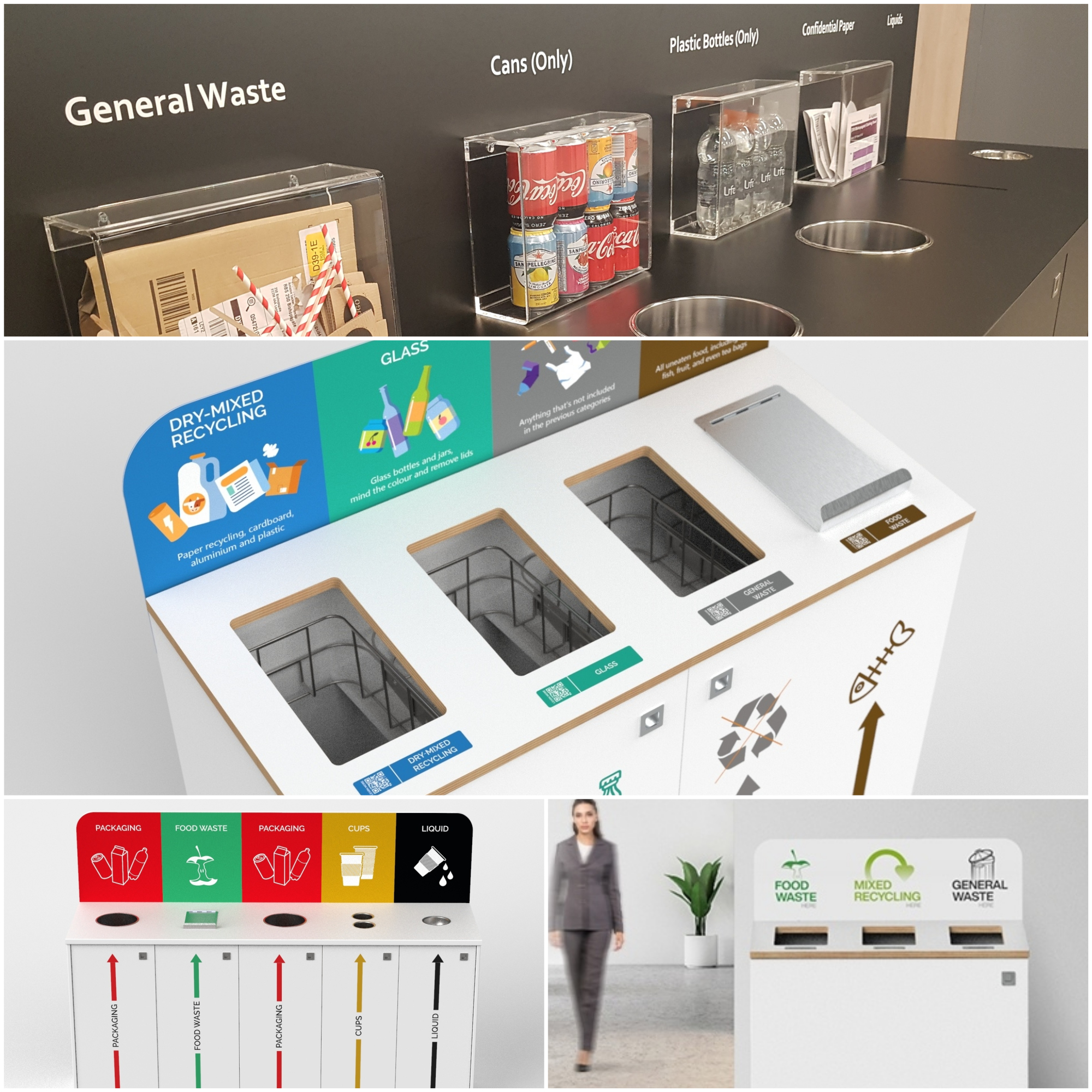
Click here to download our ‘waste stream recommendations’ brochure


